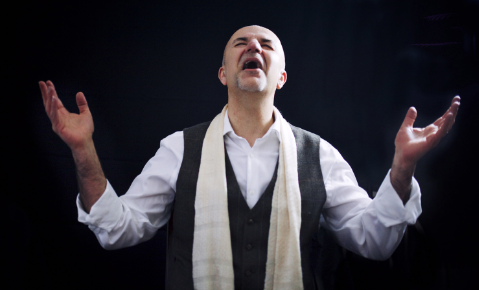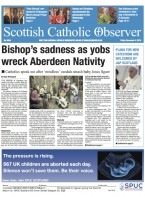August 2 | ![]() 0 COMMENTS
0 COMMENTS ![]() print
print

Bringing Christianity to the greatest show on earth this month
The Edinburgh Festival Fringe is the biggest, most eclectic Arts festival in the world, attracting millions of visitors in the month of August, and it’s growing every year. Faith in Culture’s Richard Purden speaks to two performers who are staging shows with Christian themes in what might feel like a hostile environment, and asks: does religion have a place on the Fringe circuit?
The Edinburgh Fringe expands with each passing year attracting visitors from all over Scotland and across the globe. New venues appear each year across the crowded city, as the appetite for more shows grows ever more insatiable.
Within what some might describe as an ‘anarchic’ programme there is now a growing number of Christian events taking place, among them Nick Dixon, who is bringing his comedy show Christianity and Me to the festival.
He suggests that, within the comedy circuit, ‘everyone is an atheist’. “It goes back to comedians like Bill Hicks having a pop at Christians in the 1980s and later with comedians like Stuart Lee, Jim Jefferies, and others. It’s always the same take—laughing at Christians, and I was never comfortable with that, it’s become the establishment. This show will stick out among my peers; I think it’s the most radical thing I could do. They will think I’ve gone mad but I’m doing what is happening in my life.”
Spiritual crisis
Nick, who has written with Hollywood actor Will Smith and appeared on Comedy Central and The Comedy Store, suggests there is a ‘spiritual crisis.’ “People are depressed because there is no meaning, there’s lots of promiscuity with marriages falling apart, abortion is the norm. There is a lot of self-loathing, I think there is a cultural crisis and loss of Faith in our culture.”
Christianity and Me offers a comical take on a man in his 30s returning to Faith having wrestled, thought and conversed with what he believes. “I’m asking ‘what is a Christian?’ and what do I have to do as a normal-ish bloke? It’s not a sermon but it’s saying maybe this is what we should be doing and this is what I’m doing.”
He adds: “I’ve noticed online that lots of people are going back to Christianity, young men particularly.”
Christian ‘clichés’
Asked how his friends have reacted to the show so far, he said: “I think there is a clichéd image of what a Christian is, my manager is a Christian—although he’s not someone you would immediately identify—anyone can be a Christian.
“When I began to speak to my friends about it, I found out one used to be a Eucharistic minister but had moved away from Faith—you begin to find out things like that. I had to convince some of my secular and Jewish friends but by the end, they were like ‘fair enough.’”
The comedian suggests former Liberal Democrat leader Tim Farron was treated unfairly because of his Christian Faith. “In this country and the West we are kind of embarrassed, we don’t support and stand up [for Christianity]. Tim Farron is my local MP in Cumbria and he had to quit as Liberal Democrat leader because he couldn’t be a Christian, he was getting asked trick questions and was stitched up.
“They have tried to do the same thing with Jacob Rees-Mogg but he’s been clever about it. If you were Buddhist or another religion it wouldn’t happen.”
Christians’ problems
When researching Christianity, Dixon looked at the most serious problems Christians face around the world and the political reactions they face.
“Christians are being persecuted in over 70 countries, in places such as North Korea, China, Pakistan, Sri Lanka and in Egypt which I have some experience as my ex-fiancée was a Coptic Christian. After the Sri Lanka attacks, Christians were described by major political figures such as Obama and Hilary Clinton as ‘Easter worshippers,’— Theresa May responded by focusing on churches and hotels without mentioning Christians.”
Nick is one example of a new generation using their gifts and talents in what is often considered a hostile environment for Christians.
Boundary-pushing
Stefan Smart, who is performing Mark’s Gospel word-for-word in a solo performance called I Am Mark during the Fringe, agrees that, at the festival, ‘there is that sense of boundary-pushing and the more taboo you can be the better.’ “I guess that has its place,” he says.
Smart points out that I Am Mark does not present a ‘meek and mild’ vision of Jesus. “I think the question is: does religion have a place on the Fringe? If it’s appealing, interesting and intellectually satisfying then I don’t see myself as different but perhaps a refreshing change.”
The performance offers different things to everyone in the audience, depending on their perspective, from Christians with a good knowledge of the Bible to others who know little about the life of Jesus.
Negative views
“One person differs from another, it’s the personality of the chief character that is shocking and disturbing in a good way. It resonates with people that sometimes have a negative view of Faith (which is challenged) because this person is so compassionate and loving but at the same time so authoritative.”
“I hope for individual words and phrases that would touch people, I’m hoping they can visualise this thing I am creating which is rather like an Ignatian meditation. I hope, more than anything, they can have an encounter with themselves and this person who is Love itself.”
When asked about the examples of Jesus commanding His followers to keep the miracles and who He is a secret, he said: “There are hidden depths and clues. He hints rather than say things explicitly about what is going on. He asks them [the followers] about what they think is going on.
“It is as though Mark is a parable, these things are for certain ears but not for everyone. He’s saying, I’ll leave it for those other people to work it out for themselves—it’s almost like part of the idea of the Gospel is that it’s not to be broadcast; it’s for people to think about and reflect on.”
Gospel of Mark
In Mark 7:36 we read that: “Jesus commanded them not to tell anyone. But the more He did so, the more they kept talking about it.”
Undoubtedly there are many theories and discussions about the reasons why. Smart adds that: “He probably didn’t want to arouse the animosity of the authorities and priests too early in His ministry. If the story of the young girl raised from dead got out, you can imagine the sort of trouble He might get into.”
What is clear from talking to Smart is that one line from Mark’s Gospel can take us into a place of deep contemplation. He suggests that we learn much about God’s character in Jesus’ desire to keep elements of his ministry secret. “God’s love is so very subtle and nuanced; it’s not in your face and that is very appealing.”
Studying the bible
When asked what he had learned on a personal level from performing the Gospel of Mark, he said: “How to read the Bible has been a huge change for me. You can read the Bible quite superficially. This has given me the chance to study it. The text speaks to me even if I have rehearsed it many times, it still has the power to go right into my situation as the Bible should.
He explained how the Scripture from Jesus’ Baptism in Mark 1—“And a voice came from Heaven: ‘You are my Son, whom I love; with you, I am well pleased.’” had a profound effect on him, even after having performed it many times, and led to a deep spiritual encounter. “It felt like God Himself was saying that line to me and there was a sense of God’s love that has stayed with me.
“There are numerous examples and it can happen when rehearsing a verse or line that will strike me with such force that I will burst into tears. There and then it’s like coming face to face with God.”
First encounter
With only one prop, a chair, I Am Mark takes the audience into a transformative space. For many it will be their first encounter with Jesus and some complex ideas.
“Jesus having a confrontation with evil and Satanic influences can be quite difficult to take on board,” explains Stefan. “It’s not something we come across in Western society that much. There may be other rational explanations but there’s a hurdle for the performer.
“It’s important because why would Mark put so much stress on that aspect? There are so many examples of demon possession and there is the example where Jesus himself is being accused of being possessed. The question I have is; what is going on from Mark’s point of view? There is a deliberate use of those stories about combat against the powers of evil. Mark is pointing this out and coming face to face with it and showing us what happens.”
Hard-hitting scenes
The scene in which Jesus is accused of being demon-possessed is challenging.
“I think that particular passage is really interesting, how Jesus deals with that accusation. I used to perform it as Jesus being shocked, upset and angry with being accused of something so wrong and also blasphemous,” said Stefan.
“He says that this is the sort of thing that won’t get forgiven, ever.
“Any human being would be upset, but what I like to do now is be more considered. Although this is the most horrifying thing levelled against him, Jesus’ response is not anger but sorrow and a feeling of great love for the people who are attacking Him.
“He is almost gently putting them in their place and for me, that is the pinnacle of Jesus’ attitude. He has compassion for His enemies who are at their most bitter, nasty, unjust and blasphemous. He still responds with love.”










